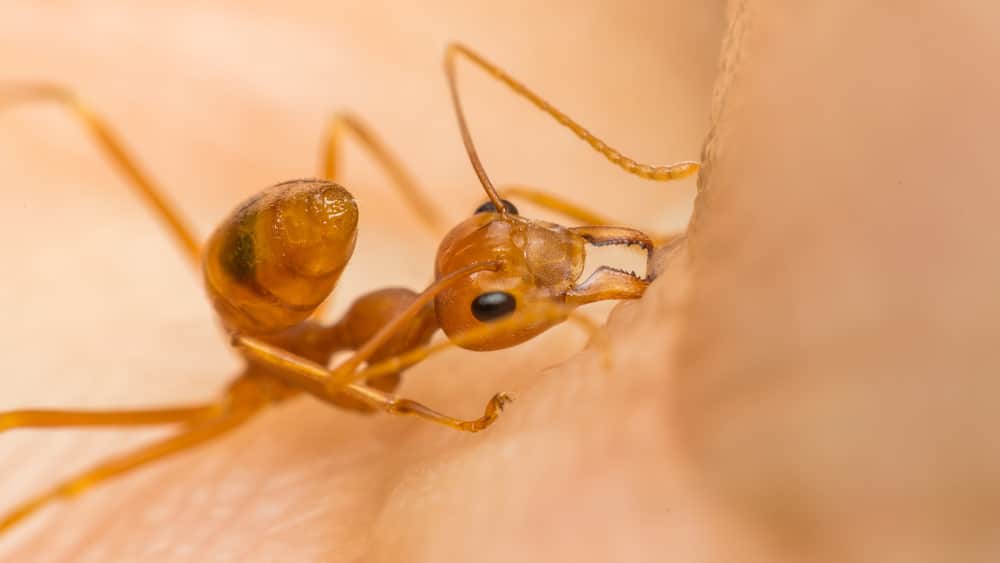Have you ever been stung by an ant? Ants are small creatures, but their sting can be quite painful. Fire ants, in particular, are known to cause considerable discomfort when they strike. But how do ants sting and why do fire ant stings hurt so much? In this blog post, we’ll explore the science behind ant stings and explain why fire ant stings hurt more than other types of ant stings. We’ll also discuss how to avoid ant bites and what to do if you’re unfortunate enough to get one. So, keep reading if you want to learn more about these fascinating insects and the reasons behind their painful defensive mechanisms. Know more about: Do ant Bites?
How do ants sting?
When an ant stings, it injects a venomous substance into its victim. The venom causes a burning sensation and is very painful. Some ants, like fire ants, have particularly potent venom that can cause serious reactions in humans. If you are stung by a fire ant, you should seek medical attention immediately.
Ants sting by inserting a sharp stinger into their victims. The stinger is connected to an organ that contains venom and the ant can inject this venom into its victim when it stings. Depending on the ant type, the sting’s severity can vary from mild discomfort to intense pain and even serious medical complications in some cases.
What are fire ants?
Fire ants are a type of stinging ant that is native to South America. They are red or black in color and have a painful sting. Fire ants are often found in gardens, on trees, or in other areas where there is food for them to eat. Do ant Bites?
Fire ants are a type of ant that is known for its aggressive behavior and painful sting. Fire ants typically build large mounds in open areas like lawns or parks. They also have the ability to travel vast distances when searching for food or water. Fire ants are highly adaptable creatures, capable of surviving in various climates around the world.
Why do fire ant stings hurt?
When an ant stings, it injects a venomous substance into its victim. This venom causes a painful reaction in humans and other animals. The venom of fire ants is particularly potent, and their stings can be extremely painful. In some cases, fire ant stings can even cause serious medical problems, such as allergic reactions or infections.
Fire ant stings hurt because they inject a venomous compound called solenopsin into the skin. This causes an intense burning sensation and can cause swelling and itching in some people.
Why do fire ants bite?
When a fire ant bites, it is actually injecting a venom called solenopsin through its stinger. This venom is what causes the painful sting and burning sensation that is so characteristic of fire ant stings. The venom also contains an enzyme that breaks down red blood cells, causing them to leak out of the blood vessels and into the surrounding tissue. In some cases, this can lead to anaphylactic shock, which can be life-threatening.
Are ant strings dangerous?
Yes, ant stings can be dangerous depending on the ant type and the sting’s severity. Fire ants, for example, are responsible for painful venomous stings that can cause anaphylactic shock in some people with allergic reactions. Other types of ants may also have venom that can cause localized swelling and irritation at the site of a sting. It is important to seek medical attention if you have been stung by a fire ant or if you experience any symptoms such as difficulty breathing or severe itching after being bitten by another insect.
Do ant Bites? How to treat a fire ant sting?
If you’ve ever been stung by a fire ant, you know that it can be a very painful experience. There are a few things that you can do to help ease the pain and discomfort of a fire ant sting:
- First, try to remove the stinger from your skin. If you can’t get the stinger out, don’t worry – it will eventually fall out on its own.
- Next, wash the area well with soap and water. This will help to remove any venom that may be left on your skin.
- Finally, apply a cool compress to the area. This will help to soothe the pain and inflammation.
Do ants have venom?
When an ant sting occurs, the venom is injected into the victim through the stinger. The venom is then transported to the venom gland, where it is mixed with other chemicals to form the final product. The mixture of chemicals in the venom can vary depending on the species of ant but typically includes a protein that causes an allergic reaction in humans. In some cases, ants also secrete a substance called poneratoxin, which can be deadly to humans. Can you answer: Do ant Bites?
Ant venom is a complex mixture of proteins and peptides which are used as weapons by ants to defend themselves against predators. Depending on the species, they can be very potent or relatively mild. Typically, ant venom has a defensive purpose, but some have evolved to produce toxins that act as insecticides or paralytics, allowing them to capture prey more easily. Ant venoms are highly specific and effective against particular targets; thus, each species produces its own unique set of toxic compounds with different effects on different organisms. Some research suggests that ant venom may even have therapeutic properties due to its wide array of bioactive substances, such as antibacterial agents and anti-inflammatory molecules.
What happens when an ant bites you?
When an ant bites you, it injects venom into your skin. This venom can cause irritation, redness, and swelling at the bite site. In some cases, the venom can also cause an allergic reaction.
When an ant bites, it injects venom into the skin, which can cause itching, redness, and swelling. Depending on the species of ant, more severe reactions may occur, such as hives or anaphylaxis. It is important to wash the bite area with soap and water and apply a cold compress to reduce swelling. If symptoms persist, contact a doctor for further treatment.
Conclusion
Do ant bites? Fire ant stings can be extremely painful and cause itching, redness, and swelling. The best way to prevent being stung is to avoid contact with fire ants or wear protective gear when working in areas where they may be present. Understanding the biology of how ants sting and why fire ant stings hurt more than other types of ant venom can help you identify if an area contains a high concentration of these pests so that you can take proper precautions.









